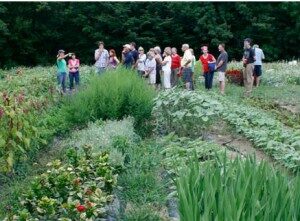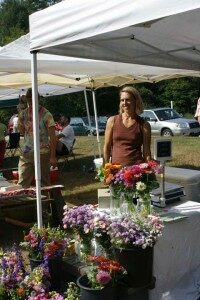By Helen Brody (December 27, 2010)

Two Mountain Farm, Andover NH
Farming has its challenges and rewards. Consider such enticements as breath-taking scenery and working in the open-air; cultivating and improving the soil; and watching seeds morph into immature plants before they turn into productive ones. Heady stuff, indeed. As Katherine “Kat” Darling of Two Mountain Farm in Andover frames it, “Farming offers a lifestyle with values that I feel are important.” And besides,” she continues, “It’s exciting to be outside and active in a practical and independent way.”
And then there are those challenges: sometimes fierce and unpredictable weather, droughts and deluges, soil quality, disease, and just plain earning a living against odds. As with all who tend the good earth, however, Kat has dedicated herself to overcome the obstacles and, ultimately, to reap the rewards.
Two Mountain Farm, bound by the familiar New Hampshire stone walls, sets in the town of Andover at the top of Shaw Hill Road. Mt. Kearsage and Ragged mountains rise above the tree line to the West. There is a neighboring small pond and the Blackwater River is a quarter – mile down the road.
The land is farmed as a partnership, between property owner Mary Anne Broshek and Kat. The total property of 55 acres has been in Mary Anne’s family since the 1950s and in conservation with the Ausbon Sargent Land Preservation Trust of the Lake Sunapee-Kearsage area. The partnership is a natural one as Mary Anne had always wanted to farm the land her parents had once gardened and Kat wanted to continue with an interest in agriculture that was spawned in college and was stimulated by working in the fields with vegetables and flowers at Maple Spring Gardens, an organic farm just north of Chapel Hill, North Carolina.
From 2005, her first year of farming, Kat has held on to one firm commitment, to farm without debt. During this start up year, she maintained a full-time job off the farm to pay the bills. She began by having what she calls her “trial” garden and taking whatever was saleable to the Wilmot Farmers’ market on Saturday mornings. The following year, she established her CSA. By setting up a Community Supported Agriculture program, she has been able to cover her annual start-up expenses (seeds, fertilizer etc.) for an organically grown garden. All shareholders have the same size share which saves on bookkeeping and packaging each week. A farm stand in Andover and the Wilmot Farmers’ market on Saturday mornings now provide the necessary revenue to cover equipment and cost of living expenses.
Most vegetables and all flowers come from seeds purchased from three different seed companies. Eggplants, some peppers and onions are bought as seedlings because they take a bit longer to germinate in the Spring. Initially, Kat’s plants began their life in her third floor apartment of Mary Anne’s farm house. After the seeds germinated under an extensive system of grow lights, the seedlings were gently moved to a greenhouse with a propane heater to keep them warm on chilly days. Starting in the Spring of 2011, with a new heated greenhouse she was able to retire the grow lights in her apartment.
The vegetables and even the flowers are grown organically. But as with many farms who support the organic ideal, Two Mountain is not certified organic. Credit the paperwork and expenses, the stuff that can drive farmers back to town. Kat adds that “also my market segment does not demand that I be certified because almost all of my retail sales come in the form of direct contact with customers. If they want to ask me about my practices, I am there to be accountable to them, to their faces. With a larger market base, however, the degrees of separation demand that accountability exist in the form of certification.”
To keep with her organic ideals, this petite blond beauty must trudge composted manure over from a neighboring stable and keeping fifty chickens provides extra fertility and a good nutrient balance for her soil. Compost tea is used as a protective barrier from insects on her foliage and rain barrels dot the property to preserve every drop of water; without a well, water is her primary bête noir. She hoses water from a neighbor’s well and waters with an extensive drip irrigation system, but in dry seasons, think 2010, a visitor may find her lugging water up from the pond. She cites her potatoes as the most vulnerable crop during dry seasons.

Interested in all parts of farming, Kat works ever closer with New Hampshire’s co-operative extension office and started Andover’s school garden for elementary and middle school students. She also takes farm tours to check out other fields and new growing and beekeeping methods such as one funded by a United States Department of Agriculture Specialty Crop Grant project led by the Kearsage Beekeepers’ Association.
As part of the project, she has two “top bar hives” and one traditional white box Langstroth hive at the back of her field. It will be seen over the course of the trial, whether the top bar hives provide easier handling and a healthier environment. Since the bar hives were developed in tropical regions, Kat is among those testing for success in New Hampshire’s cold climate.
As with all who face up to the vicissitudes of farming, Kat is fully aware of what it will take to make a go of it; hard work, patience, persistence, and yes, a little luck.
Two Mountain Farm
Katherine D. Darling
76 Shaw Hill Road
Andover NH 03216
tel: 603-724-4983
website: twomountainfarm.wordpress.com and Facebook
Retail Only and CSA: Farmers’ Markets: Check website for current listing
Farmstand: Andover, NH–main street on routes 4/11, 1 mile west of town.
Photos: Leslie Tuttle (www.leslietuttle.com)
